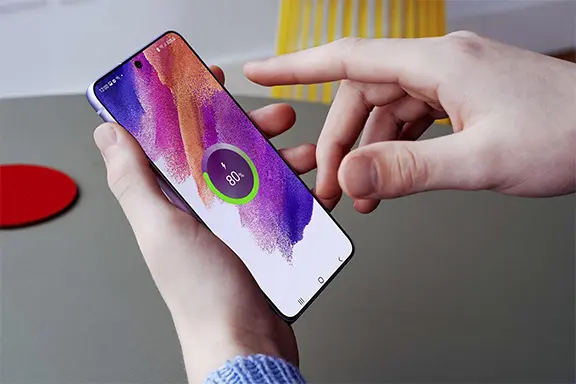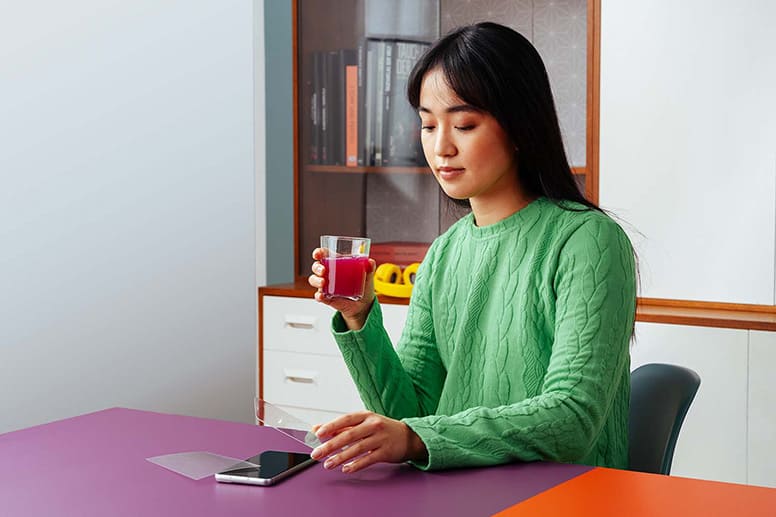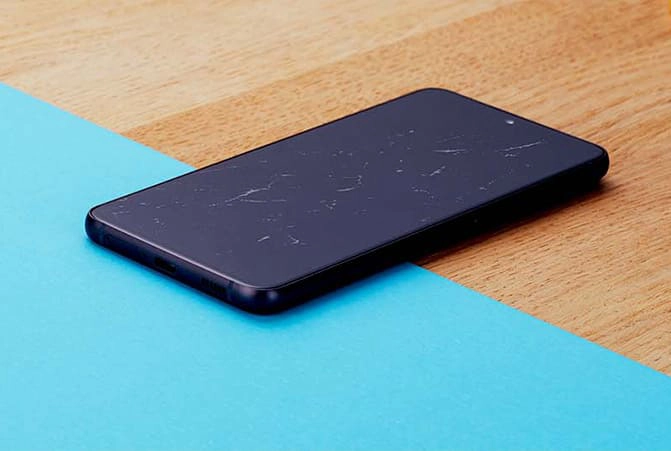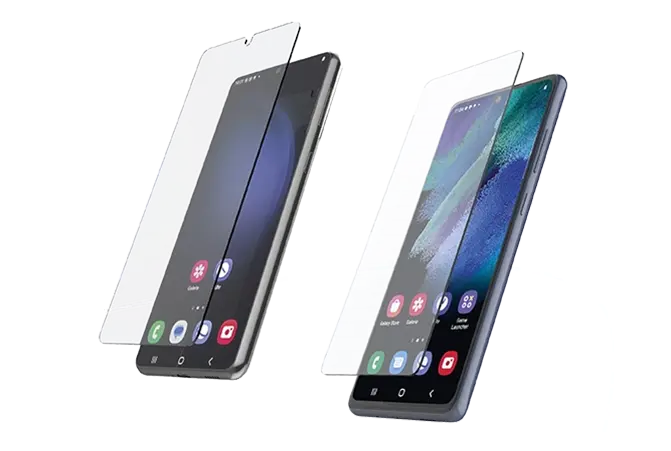A tempered glass screen protector or film?
Are you looking for suitable screen protection? We will help you decide whether a tempered glass screen protector or film is better-suited to your mobile phone.
6 min read | Nov 17, 2021
At a glance: Tempered glass screen protector or film
- Depending on the user’s needs, a tempered glass screen protector or film is better
- Film effectively protects against scratches and has a subtle look
- For heavy use, screen protection made from tempered glass is recommended
- If there are problems with the fingerprint sensor, check whether the glass screen protector has been fitted correctly
-
What is the difference between protector film and a glass screen protector?
The difference between film or glass as screen protection is that a plastic film has a more subtle look and prevents scratches, while tempered glass is tougher and also reliably protects the display from any knocks and impacts.
-
Is the fingerprint sensor impaired by a glass screen protector?
The fingerprint sensor can be impaired by a glass screen protector if small air bubbles have become trapped. It is recommended to check whether the glass screen protector has been fitted correctly so that you can get air bubbles out of the glass screen protector.
-
What hardness is sensible for a glass screen protector?
The hardness that is sensible for a glass screen protector depends on how you use it and your individual needs when using a smartphone. If your phone is subjected to significant strain, for example, 10H is recommended, as this is currently the greatest hardness and so the glass is extremely break-proof and shockproof.
The subtle difference: Tempered glass and film
If you would like to apply screen protection to your mobile phone, a glass screen protector and film are possible options – but what is the difference between a glass screen protector and protector film? For everyday use, a display film made from plastic is suitable for preventing scratches. No matter whether you keep your mobile phone in your trouser pocket with your change and keys or put it in your bag – the display always remains clear and scratch-free.
If you are on the move a lot and you can expect your mobile phone to experience a lot of wear and tear, it’s worth applying a glass screen protector. Unlike with the mobile phone film, the display is not only safely protected against scratches in this case, but also against knocks and impacts. The reason for this is the special 5-layer technology, which offers resilient, safe glass. Our screen protection glass at Hama is comprised of the following components:
- Anti-fingerprint coating
- High-tech glass (hardness 9H)
- Eco-Super-Hybrid layer
- D3O layer for extreme protection
- High-performance silicone
The Eco-Super-Hybrid layer, which is installed in the centre of the glass, holds the shards of armoured glass together. It does not shatter, but behaves in a similar way to a windscreen or shower cubicle. This means that the display is always reliably protected until you remove the armoured glass - and you no longer need to worry about your mobile phone display!
Discover the advantages and disadvantages: Film and tempered glass
If you are choosing between tempered glass and film for your smartphone, both options offer you many advantages – and few disadvantages.
| Needs | Film | Tempered glass |
|---|---|---|
| Prevents scratches | ||
| Subtle look | ||
| No change to display haptics | ||
| Optimum visibility | ||
| Can be removed without residues | ||
| Maximum surface hardness | ||
| Prevents a cracked screen | ||
| Long-lasting protection | ||
| Avoids air bubbles | (more about removing bubbles) |
prevents the formation of bubbles (as long as no dust is trapped) |
| Film replacement | necessary now and then if the film is too scratched and impairs the view of the display | necessary if the glass breaks |
If you are now considering a real glass screen protector for your iPhone, we recommend, for example, the ‘Super Hybrid’ mobile phone protection glass for iPhone 16 Pro or the ‘Super Hybrid’ mobile phone protection glass for Apple iPhone 13/13 Pro/14/16e. Take your time to choose the best solution for your mobile phone!
Super Hybrid: Advantages combined
Screen protection that combines the best properties of film and glass screen protectors – too good to be true? Why not take a look at the “Super Hybrid” screen protection? Made from 100% recycled PET material with industry-standard D3O technology, it is flexible and unbreakable so that it does not need to be replaced, just like armoured glass. With a clear display look, it completely covers the display right up to the edge and offers highly effective scratch, impact and shock protection.
Conveniently select your super hybrid screen protector for your smartphone model, for example the ‘Super Hybrid’ mobile phone screen protector for Apple iPhone 16 Pro Max.
All armoured glass models from Hama come with environmentally friendly eco-mounting aids for easy and precise installation.
Does a glass screen protector impair the touchscreen?
Some users report that the fingerprint sensor does not work with screen protection made from tempered glass. One reason for this may be small air bubbles that disrupt the ultrasound – that’s naturally something you want to avoid! First of all, you should check whether the glass screen protector is fitted correctly. If you have problems with the touchscreen, you can adapt the touch sensitivity of the display by going to “Settings” and “Display” and activating or deactivating “Touch sensitivity” there.

Our tip: Fast fingerprint identification on devices with ultrasound sensors works with the “Hiflex” screen protection, which we have already presented above – a real insider’s tip for smartphones with a fingerprint sensor in the display!
A tempered glass screen protector or film: What’s better?
Now we have advised on you the advantages and disadvantages of tempered glass screen protectors and film, the decision is yours. Which of the two options better suits your smartphone depends on your needs and individual mobile phone use. A glass screen protector is sensible if you need tougher protection against scratches and particular longevity, while a screen protector foil is visibly less noticeable and has a very good price-performance ratio.

Our extra tip: It’s also worth protecting the sensitive back of your smartphone. To complement our screen protection glasses, you will find many phone cases for various smartphone models and also camera lens protectors, which protect your phone camera from scratches.




